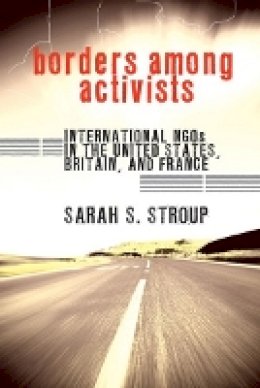
Borders among Activists: International NGOs in the United States, Britain, and France
Sarah S. Stroup
In Borders among Activists, Sarah S. Stroup challenges the notion that political activism has gone beyond borders and created a global or transnational civil society. Instead, at the most globally active, purportedly cosmopolitan groups in the world—international nongovernmental organizations (INGOs)—organizational practices are deeply tied to national environments, creating great diversity in the way these groups organize themselves, engage in advocacy, and deliver services.
Stroup offers detailed profiles of these "varieties of activism" in the United States, Britain, and France. These three countries are the most popular bases for INGOs, but each provides a very different environment for charitable organizations due to differences in legal regulations, political opportunities, resources, and patterns of social networks. Stroup's comparisons of leading American, British, and French INGOs—Care, Oxfam, Médecins sans Frontières, Human Rights Watch, Amnesty International, and FIDH—reveal strong national patterns in INGO practices, including advocacy, fund-raising, and professionalization. These differences are quite pronounced among INGOs in the humanitarian relief sector, and are observable, though less marked, among human rights INGOs.
Stroup finds that national origin helps account for variation in the "transnational advocacy networks" that have received so much attention in international relations. For practitioners, national origin offers an alternative explanation for the frequently lamented failures of INGOs in the field: INGOs are not inherently dysfunctional, but instead remain disconnected because of their strong roots in very different national environments.
Product Details
About Sarah S. Stroup
Reviews for Borders among Activists: International NGOs in the United States, Britain, and France
Lili Wang
Voluntas
"OverallStroup's book is a much-needed corrective to the too-easy assumption that a "global civil society" is emerging.... Stroup's work opens the door to greater scholarly focus on the tensions within what are often claimed to be "global" movements for rights or the environment."—Clifford Bob
Mobilization
In explaining how national environments mold INGOs, Stroup provides important insights into the strengths and limitations of these entities. Borrowing from social movement scholar Sidney Tarrow, Stroup defines INGOs as rooted cosmopolitans grounded in nation-states yet striving to affirm global values. Borders among Activists should be required reading for anyone interested in navigating the sea of organizations in the age of globalization.
American Journal of Sociology
Sarah Stroup's excellent new book shows that such convergence claims are overblownat least if humanitarian and human rights INGOs are any measure.... OverallStroup's book is a much-needed corrective to the too-easy assumption that a "global civil society" is emerging. Borders among Activists helps initiate an important new area of studyon the "varieties of activism".... Stroup’s careful analysis offers a reliable conceptual and methodological guide to tackling the issue." — Clifford Bob
Mobilization: An International Quarterly
